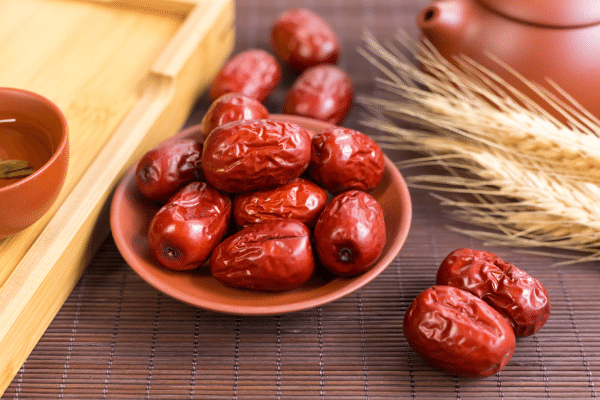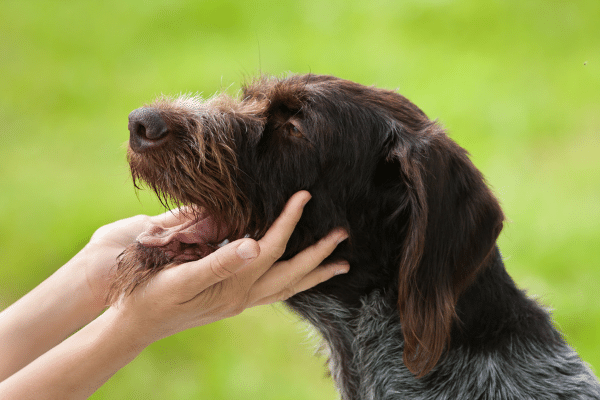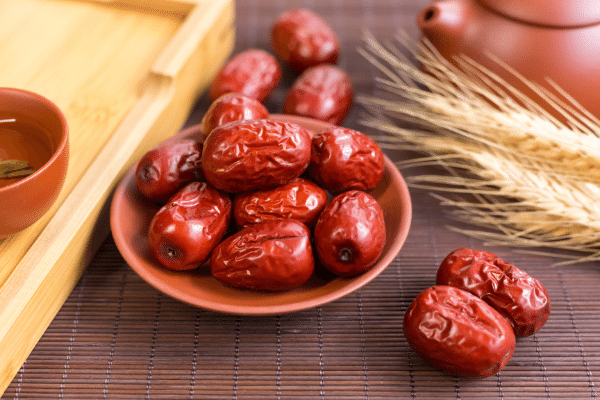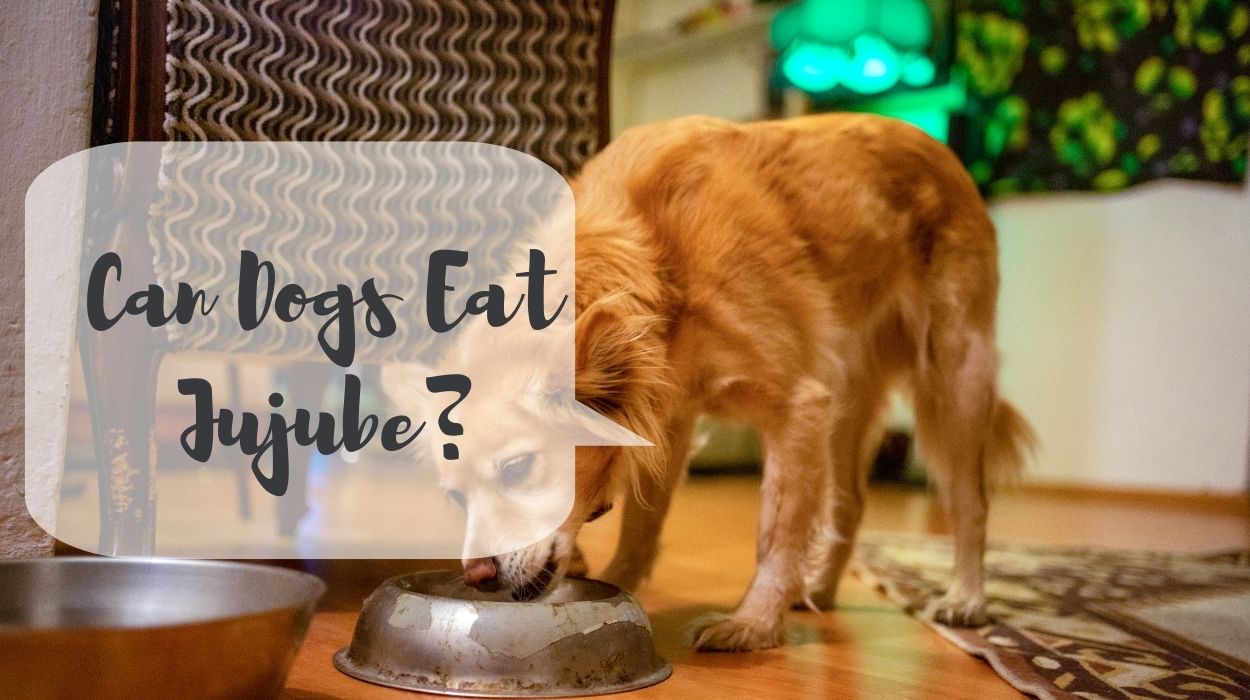Jujube is an antioxidant-rich superfood that helps in sleep and digestion in the human body. But have you ever thought of sharing this superfood with your four-legged furry companion?
People who are dog owners and jujube lovers seem to wonder, is Jujube as beneficial for their dogs too? Will Jujube affect a dog in the same way it affects the human body? Then, it would be best if you jumped right into this article.
We will understand the potential risks and benefits of feeding jujube to your doggo. Let’s get started!
Is Jujube safe for dogs?

The answer, unfortunately, is no. The science behind Jujube being a superfood for humans and a super hazard for dogs is that dogs have a different metabolism than humans. The digestion process in humans is way different than that of a dog.
Jujube has a high sugar content, and high-level sugar consumption can prove to be hazardous for your dog. However, you can offer a moderate amount of jujube fruit pulp as an occasional treat.
It is also essential to ensure that you do not offer seeds and pits of the fruit. These are bitter and can harm your dog’s health.
Although jujubes do not come under the list of harmful food items that should be kept away from dogs, jujube can prove to be really good for your dog only if given in moderation.
Why should you not feed the seeds of Jujube fruit to your dog?

The seeds and pits of the jujube fruit can prove to be fatal and have the following impacts:
- respiratory illnesses
- choking
- intestinal blockage
- death; as the seeds are rich in cyanide
Are there any health benefits of offering Jujube’s pulp to your dog?

Despite the high sugar content, some of the components in its pulp are, in fact, beneficial for dogs. The components are as follows:
- Vitamin C
Vitamin C acts as an antioxidant for dogs, thus removing harmful free radicals and helping a dog live a happy and long life.
- Dietary Fiber
Constipation is one of the common issues that our cute little buddy comes across. Jujube pulp is rich in dietary fiber, which is gut-friendly and helps keep your dog’s tummy healthy.
- Anti- Anxiety
The pulp is also known to have a calming effect on your four-legged furry friend and keeps him relaxed. Moreover, jujube pulp helps keeping a dog’s anxiety at bay.
It triggers a neurotransmitter in the brain known as serotonin. It is a well-known fact that serotonin is primarily responsible for stabilizing the mood and produces a sense of well-being.
- Anti- Inflammatory
Another crucial benefit of the jujube is that it contains a certain phytochemical known as saponin. This helps in the protection and strengthening of the cardiovascular system and the liver. It also boosts the immunity of your furry friend.
Is Jujube toxic to dogs?
No. Jujube is not toxic for your adorable canine companion. However, it would be best to always serve it to him in very limited amounts due to its high sugar levels, as mentioned in the article above.
The following are some of the common problems observed in dogs after excessively consuming jujube:
- Obesity
- Diabetes
- Dental problems
- Heart problems
- Shortening of the lifespan
WARNING: It would be best to avoid feeding dried jujubes to your dog. It is because their sugar content is a lot more than that of jujubes in their original state.
While jujubes are not a life-threatening hazard for your dog, the amount of carbs and sugar is a reason enough to make Jujube an occasional treat for your furry friend.
As a smart pet owner, it would help to ensure that if and when your pup consumes jujubes, they are freshly procured. Moreover, they must be seeds, pits, and stalk-free.
However, if your dog is battling obesity or diabetes, we highly discourage its consumption.
How many jujubes should you give to your dog?

Whenever feeding jujubes to your dogs, always keep in mind these are rich in carbs and sugar, so make them your pooch’s occasional treat.
According to veterinary nutritionists, fruits and treats should make up only 10% of a dog’s meal. This should be treated as a guideline while giving your dog jujube.
Supposedly, if your dog has a nutritional requirement of 1000 calories every day, the dog food constitutes 90% of the calories, and the latter 10% should be set aside for treats. That is 900 calories from actual food and 100 calories from treats, including Jujube.
Jujube is richer in Vitamin C than any other fruit in the citrus family and is rich in dietary fiber. If your dog can digest sugar, you can offer your doggo a moderated amount of the pulp free of seeds and pits. Ensure that its consumption should be no more than 10% of its calorie intake, or things may take a turn for the worse.
NOTE: 100 grams (about three jujubes), equivalent to 79 calories, is already too much for intake. Alternatively, a cup of sliced cucumbers is merely eight calories.
FAQs
Q. Can Elderly Dogs Eat Jujube Fruit?
Yes, but only in small quantities. Elderly dogs are more likely to fall sick due to sugar intake and suffer from arthritis, making it difficult for them to chew jujubes.
Q. Can Pregnant Dogs Eat Jujube Fruit?
Depends. Pregnant dogs can have jujube only if cut into small pieces and free of pits. However, we advise you to seek your vet’s approval before introducing new foods to a pregnant dog to avoid profound implications.
Conclusion
The bottom line: jujube is good for dogs and they can eat them but in moderation. In the above article, we have discussed the right way to give your dog jujubes.
We talked about the various ways jujube can prove to be beneficial for your dog and the precautions that should be taken while treating your four-legged buddy with jujube.
Have more doubts? More suggestions related to the topic above? Drop-in our comments section, and we’d love to chat with you and clear your doubts.

Dr. Aram Baker has been with Santa Clarita Animal Hospital since 1995 and his special interests include behaviour medicine and dermatology. He graduated from the Cleveland Humanities Magnet Program in Reseda, CA and attended California State University at Northridge where he received a Bachelor’s degree in biology. He went on to pursue his Doctorate in Veterinary Medicine at the University of California at Davis. He also spent time in the zoological medicine department at U.C. Davis during his Junior and Senior years. He is dedicated to caring for all pets big or small, young or old with compassion, patience, kindness, and love.
